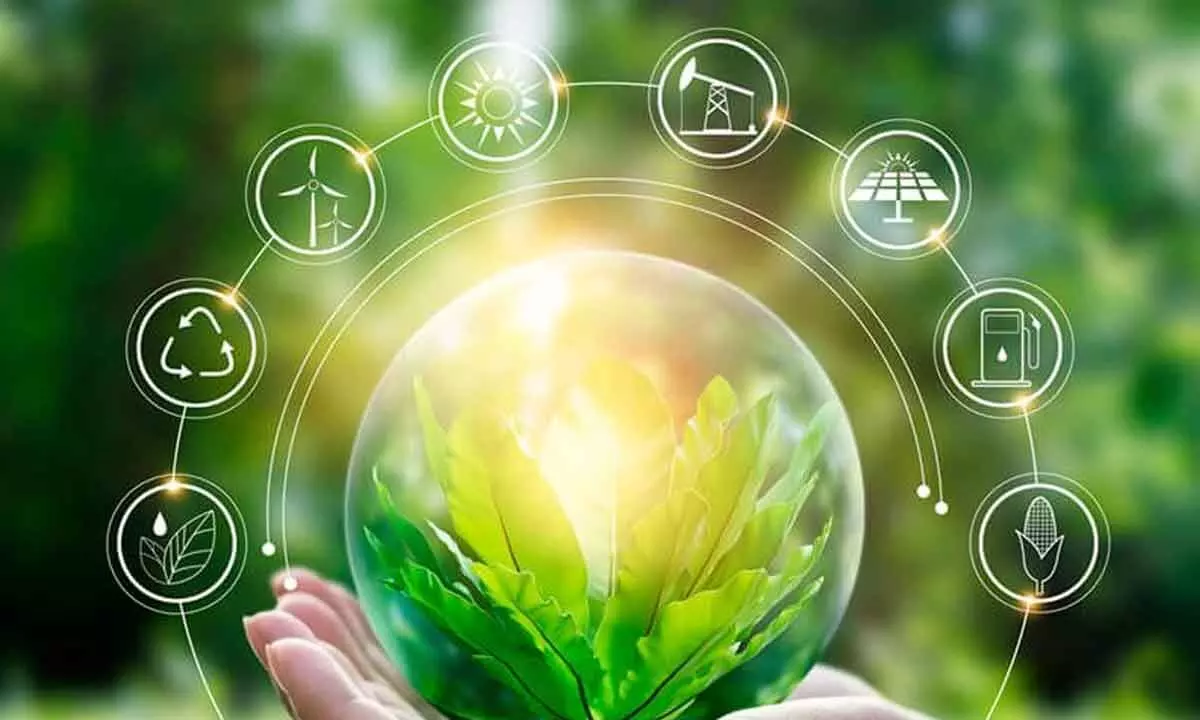Green skill development programme in India

New Delhi: Sustainable development is becoming more and more crucial as the globe struggles with issues like pollution, climate change and the loss of natural resources. By boosting renewable energy, lowering greenhouse gas emissions, and expanding access to clean water and sanitary facilities, India has made considerable strides toward sustainable development in recent years. The Green Skill Development Program (GSDP) is one of India's most important efforts to promote sustainability.
The National Skill Development Corporation (NSDC) is in charge of implementing the GSDP, which was introduced in 2017 by the Ministry of Environment, Forest, and Climate Change (MoEF&CC). The course aims to develop a pool of qualified workers in the environment and forest sector, including renewable energy, pollution control, and biodiversity preservation. It focuses on giving young people, especially those from rural and poor areas, training and certification in a variety of "green skills" for the nation's sustainable growth.
Green skills
Green skills refer to the knowledge, abilities, and expertise required to develop and implement environmentally sustainable solutions in various industries and sectors. These skills are related to environmental protection, renewable energy like solar and wind energy, sustainable agriculture, waste management, and other areas that support sustainable development.
The GSDP has identified 80 different green skills that are in demand in India. These skills are categorised into various sectors like biodiversity conservation, environmental management and pollution control, renewable energy, energy efficiency, waste management, sustainable agriculture, climate change mitigation and adaptation, sustainable water management, eco-tourism, sustainable building designs, and sustainable construction.
Dualistic strategy
The GSDP has a two-pronged approach. On one hand, it provides training for the enhancement of skills and knowledge to those who are already working in the environmental sector, such as forest guards, park rangers, and environmental scientists. On the other hand, it aims to create a new workforce of skilled individuals who can contribute to better management and conservation of the environment in various sectors, such as waste management, renewable energy, sustainable agriculture, etc.
National skills qualification framework
The GSDP is designed to cater to the diverse needs of the industry and the environment sector and is aligned with the National Skills Qualification Framework (NSQF) to ensure standardisation and recognition of skills.
Scope of GSDP
The GSDP has a wide scope and covers various regions and communities across India. It has partnered with several institutions, both government and non-governmental, to implement the programme. These institutions include the Indian Institute of Technology (IIT), the Indian Institute of Forest Management (IIFM), the Wildlife Institute of India (WII), the Centre for Environment Education, and the National Institute of Solar Energy, among others. The programme has also collaborated with state governments particularly the forest departments and pollution control boards to ensure that it reaches all regions of the country.
Benefits of GSDP
The GSDP has several benefits, both for individuals and for the country as a whole. For individuals, it provides an opportunity to gain new skills and knowledge in a growing sector. It also enhances their employability and opens up new job opportunities. For the country, it creates a skilled workforce that can contribute to its sustainable development. It also promotes the conservation and management of the environment.
The GSDP has helped contribute to the growth of the green economy in India. According to a report by the NSDC, the programme has trained over 2 lakh candidates in various green skills and has placed more than 60,000 candidates in jobs in the environment sector. The programme has also created self-employment opportunities for many of the trainees, who have started their own ventures in areas such as organic farming, eco-tourism, and renewable energy.
Recognition
The GSDP has also been recognised and appreciated by various national and international organisations for its innovative approach and impact. In 2019, the GSDP was awarded the Future Policy Gold Award by the World Future Council, in recognition of its contribution to sustainable development and green skills. The programme has also been acknowledged by the United Nations Environment Programme (UNEP) and the International Labour Organization (ILO) as one of the best practice in green skills development.
Challenges
The GSDP has faced some challenges in its implementation. One of the challenges is the lack of awareness among the general public about the programme. Besides, there is a dearth of interest among the industry and employers in hiring green skilled workers. Another challenge is the lack of adequate infrastructure and resources in some areas. The GSDP is a step in the right direction. The programme has the potential to contribute significantly to India's green economy and environmental conservation efforts. With the right support and resources, the GSDP can create a skilled and trained workforce that can drive sustainable development and contribute to the well-being of society, the country, and the ecosystems.
(The writter is the founder of Smiling Tree)








